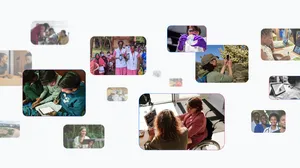A year of lessons learned from Google.org

At Google.org, we’re fortunate to work with some of the world’s best social innovators. In 2018, we donated over $240 million to nonprofits around the globe, and Googlers gave more than $56 million of their own money and 227,000 hours of volunteer time to great causes. As we start the new year, here are the most important lessons we learned from our work.
1. Ask bigger questions, and test the answers.
To identify and fund innovative ideas, we ask “how might we” questions. For instance, along with GiveDirectly and USAID, we asked, “How do outcomes compare when we give people cash versus traditional (in-kind) aid?” We funded a first of its kind project testing the impact of cash transfers and a nutrition-focused (non-cash) intervention. While neither the traditional intervention nor a cost-equivalent cash transfer shifted nutrition metrics, a larger sized cash transfer did, and also impacted a number of economic indicators. We hope this study provokes greater discussion about the potential role of cash.
We’ve supported with many other organizations and think tanks which are asking tough questions that can impact how we address pressing issues, like the future of work. We funded research analyzing how demographic change is driving automation, and how an economy with an aging population can sustain growth. With The Workers Lab, NDWA and The New School, we’re looking at studies to test new ways to help today’s workers, such as benefits which aren’t tied to a specific employer, a tax benefit to help caregivers become more financially secure and pooling resources to help gig workers.
2. Googlers have huge potential to amplify community work.
In 2018 we connected Google engineers with dozens of local nonprofits, particularly in communities where they live and work. Each time Googlers and our grantees come together, we can test the impact of introducing people with certain technical skills to people who have expertise in issues that impact communities, like disaster response. As a result, we can deploy smarter solutions faster.
Several devastating fires hit very close to our California home in November. Google.org sent 18 Google volunteers to support with Information Technology Disaster Resource Center (ITDRC) to repair wifi connections and capture aerial and street-level imagery to help evaluate the damage. In 2018, more than 20 Google employees, working alongside The Last Mile, prepared incarcerated individuals for successful re-entry into the workforce, specifically helping the organization expand its coding curriculum to juvenile facilities. And in London, Googlers inspired students from Color in Tech to get excited about technology and computer science through hands-on AR/VR and robotics exhibits.

3. Global tech solutions require global participation.
One of my favorite parts of my job is to meet social innovators from around the world. Each time I do, I am reminded that there is no one-size-fits-all solution to the myriad of problems we are addressing globally, both within Google.org and as a community. I’m particularly proud of the work our team has done through our Google.org Impact Challenge program, which asks local and regional nonprofits how they would make their community—and beyond—an even better place.
Google.org President Jacquelline Fuller stands with fellow judges from Google.org Impact Challenge Australia.

In 2018, we held nine Impact Challenges, our most ever in one year. Local leaders and experts identified 164 winning ideas from around the world, from Australia to Kenya to Cleveland. We provided seed funding for exciting new ideas, like monitoring ocean ecosystems using drones, AI and a sea mammal, applying Big Data to help small farmers allocate water and fertilizer and advancing manufacturing careers for inner-city youth. These ideas demonstrate how technology isn’t just something that can come out of Silicon Valley. It’s something for all of us to build together.
4. We have even bigger goals for 2019.
Our latest and most ambitious ever challenge, Google’s AI Impact Challenge, is how we plan to hit the ground running in 2019. We are inviting nonprofits, social enterprises and researchers with big ideas on how AI can help them further their mission to apply by January 22. Winners will receive funds from a grant $25 million grant pool, plus coaching, so they can test and implement their ideas.
Stay tuned: We’ll announce the recipients at Google I/O 2019.







